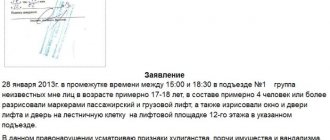Intentional injury to health is punishable by law. In practice, cases of beatings often remain unattended even after repeated complaints to law enforcement agencies.
Often people who unwittingly fall under the hot hand have to put up with injustice. Choosing such tactics for yourself is not the best option. You need to defend your rights to the last using all possible legal means.
The article for beating a person implies punishment up to imprisonment for a term of up to 15 years. It all depends on the severity of the harm caused.
Article for beating a minor child
There is no separate article in the Criminal Code for causing harm to a minor. However, the fact of beating a minor is an aggravating circumstance.
Important. A child under 14 years of age is considered a minor, and from 14 to 18 years of age is considered a minor.
You are advised by the best qualified lawyers
Free: Our lawyers provide free initial consultation on any legal issues. 90% of cases are resolved with one free consultation.
24/7: real estate via online chat, or call the hotline 24 hours a day, 7 days a week
The punishment for beating a young child depends on the amount of harm caused:
- clause "b" part 2 art. 111 of the Criminal Code - a criminal can be imprisoned for 10 years;
- clause "c" part 2 art. 112 of the Criminal Code – deprivation of freedom for 5 years;
- clause "g" part 2 art. 117 the offender is imprisoned from 3 to 7 years.
Note!
According to Art. 63 of the Criminal Code, any violation of the law in relation to children under 18 years of age is always considered an aggravated violation. Consequently, the punishment changes upward.
Factors influencing the qualification of an incident
When deciding under which article the attackers will be charged, law enforcement agencies rely on the following conditions:
- the severity of the harm caused to the victim’s health;
- how many attackers there were; how many were attacked - if there were several, this usually aggravates the guilt;
- what goals they pursued;
- whether the victim is a minor - this increases the severity of the punishment that may follow;
- whether there was a conspiracy before committing a group crime (beating).
For a conviction under any of the articles relating to battery, the main parameter for classification is the first point. Depending on how seriously the victim suffered, for a group crime, Articles 111, 112, 117 may be applied. Criminal Code of the Russian Federation. Causing harm that can be considered minor is also covered in Art. 115, but it does not provide for a separate punishment for a group assault with beating. The situation is similar with Art. 116, which provides for liability for beatings that did not entail significant consequences, but were accompanied by pain. It also does not have a separate clause for group action.
Article of the Criminal Code of the Russian Federation for group beating
An offense committed by a group of people is punished much more severely than a crime committed alone. Assault is no exception.
The punishment in the form of imprisonment, according to the following articles, is:
- clause “a”, part 3, art. 111 Criminal Code – up to 12 years;
- item "g" part 2 art. 112 Criminal Code – up to 5 years;
- clause "e" part 2 art. 117 of the Criminal Code - from 3 to 7 years.
Note!
To be punished under these articles, there must be a prior agreement between the accused. If this is not established, then the charge is qualified under paragraph “c” of Part 1 of Art. 63 of the Criminal Code.
Punishment
What punishment is chosen and how many years they give for beating a person is influenced by a number of factors that have already been mentioned.
The maximum term is 15 years, provided for by the most severe article in this area - 111 of the Criminal Code of the Russian Federation - serious injury to health.
Article 111 of the Criminal Code of the Russian Federation . If the victim was deliberately inflicted with serious harm to health, life-threatening, or this led to loss of hearing, vision, speech, internal organ or stoppage of its functioning, termination of pregnancy - punishment is provided in the form of imprisonment for a term of up to 8 years.
A similar punishment is threatened if, after the beating, the victim’s face is disfigured, a mental disorder is diagnosed, or he becomes addicted to drugs (substance abuse), or completely loses his ability to work or at least a third.
The same crime is punishable by imprisonment for up to 10 years, with or without a limitation of up to 2 years, if it is committed:
- In relation to a person performing a public duty, carrying out official activities or his relatives;
- In relation to minors or helpless people, obviously innocent;
- For hooligan reasons/in a generally dangerous manner/for hire/for reasons of hostility/for the purpose of sale, transplantation of organs or tissues/using weapons or objects as such.
Punishment of up to 12 years with or without a limitation of up to 2 years is given when the above crimes are committed by a group of persons or in relation to 2 or more persons.
And if there is a death, the penalty is up to 15 years. In other articles the punishment is less.
What is the penalty for light battery?
For causing minor injuries, the punishment is in accordance with Art. 115 of the Criminal Code. Damage to health is expressed in loss of ability to work for up to 3 weeks. The punishment is:
- fine of up to 40,000;
- compulsory work for up to 1 year;
- detention for up to 4 months.
Note!
Responsibility for the committed actions reflected in Art. 115 of the Criminal Code depends on whether there are aggravating circumstances in the actions. In this case, the offender may face prison for up to 2 years.
In addition to physical damage, beating causes material and moral damage. These actions may be subject not only to criminal liability, but also to filing a claim for damages.
Corpus delicti
The legislation provides for administrative or criminal liability for beatings under Art. 6.1.1 Code of Administrative Offenses and Articles 116, 116.1 and 117 of the Criminal Code. They have a similar composition with some differences in the object of the crime (Article 116.1 of the Criminal Code) and motives (Article 116 of the Criminal Code).
An object
Beatings violate a person’s right to physical integrity, humiliate him as a person, and damage the health and mental state of the victim.
Objective side
“Battery” refers to blows or other acts of a violent nature directed against the victim and causing pain:
- pinching;
- bites;
- hair pulling;
- twisting of limbs;
- pinching or squeezing of a body part;
- flogging.
Number of beats
Strikes or other actions must be performed multiple times (more than twice). Inflicting one blow cannot be considered beating. This violation (in the absence of harm to health) will be classified as hooliganism under the Criminal Code of the Russian Federation or insult.
Consequences of the beating
Additionally
, in the case where the beatings did not violate the anatomical integrity of the body tissues, but led to physical pain and ailments, they will also be taken into account in the medical report. The forensic expert will record the victim’s complaints and also indicate that there are no visual signs of damage and the severity of the harm has not been determined.
Beatings can do without visible consequences or leave superficial damage on the body:
- abrasions;
- scratches;
- bruising;
- bruises;
- small wounds.
However, they do not lead to temporary or permanent disability. Although, such consequences may not occur immediately, but over time. In this case, the act will be reclassified as “harm to health” under articles of the Criminal Code - 115, 112 or 111, depending on the severity of the injuries. The article https://lexconsult.online/6615-osobennosti-provedeniya-sudebno-meditsinskoi-ekspertizy-tyazhesti-vreda-zdorovyu discusses the criteria for determining the severity of harm to health.
Subject
Responsibility for battery is borne by an individual aged 16 years or older who was in a sane state at the time of the commission of the crime. Taking into account the changes made to the Criminal Code by Federal Law No. 323 of July 3, 2016, the subject of a crime classified under Art. 116.1 of the Criminal Code, is a close relative of the victim:
- spouse;
- parent (adoptive parent);
- son (daughter), including adopted one;
- sibling;
- grandfather grandmother);
- grandson;
- brother-in-law, matchmaker;
- guardian (trustee);
- person running a joint household.
For amendments to Article 116 of the Criminal Code of the Russian Federation “Beatings”, see the following video
Subjective side
An unlawful act is committed with direct intent - causing pain to the victim is the conscious goal of the offender. If the damage was caused unintentionally, it is identified as minor harm to health caused by negligence (you can read about unintentional harm to health). This violation is not subject to criminal penalties. However, the victim can file a civil lawsuit against the perpetrator and recover compensation from him for material and moral damage.
The motives for the beating affect his qualifications. Thus, criminal liability for beatings under Art. 116 of the Criminal Code threatens a criminal who has committed an act from:
- Hooligan motives.
- Ideological principles.
- Hatred towards representatives of a certain:
- political group;
- race or nationality;
- religion;
- social group.
If the beating occurred out of personal hatred towards the victim, the violation will be qualified under Art. 6.1.1 Code of Administrative Offences.
Moderate battery article
Battery of moderate severity constitutes damage to health or loss of ability to work for a long period.
A person cannot fully perform his job, for example, drive a car, cook food, etc.
From a medical point of view, this is when internal organs and skin over large areas of the body are damaged. These injuries do not pose a threat to human life. This also includes mental disorder that occurs when in contact with a criminal.
Very often, due to ignorance of the laws, the victim cannot bring the criminal to justice.
The punishment for assault of moderate gravity is defined in Art. 112 of the Criminal Code and consists:
- restriction of freedom up to 3 years;
- forced labor for up to 3 years;
- arrest up to 6 months;
- imprisonment for up to 3 years.
Question answer
Question:
Is the fate of the instigator of a fight softened if he himself suffered?
In practice, there are cases when both persons participating in a fight receive bodily injuries and leave statements to the police to initiate a criminal case. Usually, the testimony of the one who was forced to defend himself is taken into account - this person involved is recognized as the victim. The other participant will be denied the opportunity to initiate a case, insofar as it is believed that the damage was caused to him not intentionally and in self-defense. At the same time, if the instigator of the fight received bodily injuries that seriously undermined his health, then the presence of the disease can be taken into account by the court as a mitigating circumstance.
Question:
The victim himself provoked the fight, how much does this mitigate the guilt of the one who committed the beating?
In criminal law, unlawful behavior is taken into account in favor of the accused. Thus, Article 61 of the Criminal Code of the Russian Federation directly provides as a mitigating circumstance the behavior of the victim, which was a definite reason for committing a crime. For example, if the victim insultingly calls the accused names, insults him or his relatives, then in the event of bodily harm being caused “in response” to the immoral actions of the victim, these circumstances will be recognized as mitigating.
Question:
How is it proven that a person accused of assault is insane or mentally ill and does this affect the punishment?
Even at the stage of preliminary investigation, the accused, if there is the slightest doubt about his mental health, is assigned an outpatient psychiatric examination. In difficult cases, questions about sanity will be raised in a comprehensive inpatient examination. If the experts confirm insanity, the criminal case will be sent to the court with a request to apply those compulsory medical measures that were recommended by doctors. In this case, no punishment is imposed on the perpetrator.
What will happen to beating a person and stealing?
The punishment for the actions of the criminal for beating and theft depends on the amount of damage caused to the health of the victim.
Such actions without causing harm to health can be considered in accordance with clauses “a”, “d”, part 2 of Art. 161 of the Criminal Code, as robbery. Those. there is a group theft of property by prior conspiracy and with the use of violent actions, but not dangerous to health.
The punishment in this case is:
- forced labor for up to 5 years;
- imprisonment for up to 5 years;
- fines in the amount of the perpetrator’s monthly income with or without restriction of freedom for up to 1 year.
If damage to health is established, the actions of the perpetrators are considered robbery, in accordance with Part 2 of Article 162 of the Criminal Code. Those. the theft of property occurred with the use of violence that was dangerous to the health or life of the victim, or with threats to use violence, committed by a group of people by prior conspiracy.
Here the punishment is:
- imprisonment for up to 10 years and fines up to 1 million rubles.
- imposition of a fine in the amount of the offender’s income for five years and restriction of freedom for up to 2 years.
Fine up to 40 thousand rubles, serving compulsory or correctional labor
Only certain types of battery are considered criminal offenses. So, battery is a crime if:
- caused to close people (the concept of close people is in the note to Article 116 of the Criminal Code of the Russian Federation, these include children, parents, spouses, brothers, sisters, grandchildren, grandmothers, grandfathers);
- inflicted from hooligan motives;
- the crime was committed based on national or religious hatred.
In other cases, liability occurs if the perpetrator has already been subjected to administrative punishment and the fact of beating on his part is repeated. In accordance with the sanction of Article 116.1 of the Criminal Code of the Russian Federation, which provides for liability for repeated beatings, punishment is possible in the form of:
- fine up to 40,000 rubles;
- compulsory work up to 240 hours;
- correctional labor for a period of six months.
Criminal liability for battery with risk to life
The most common article under which the perpetrator is most often punished is Art. 116 of the Criminal Code. However, the victim often misses the deadline to contact law enforcement agencies, and therefore most of the evidence is lost:
- whether it was hooliganism;
- or the crime occurred for religious reasons or is related to the nationality of the victim;
- whether a weapon or the like of a weapon was used.
According to paragraph 2 of Art. 115 of the Criminal Code, either there can be an arrest for up to 180 days, or the period of arrest is extended to two years.
If there are systematic beatings, the penalty increases according to the following factors:
- number of perpetrators – from 2 people or more;
- the offender used torture or committed other acts that resulted in severe physical and moral harm;
- the criminal act is associated with racial and religious intolerance.
In this case, according to clause 2 of Art. 117 of the Criminal Code, the offender may lose his freedom for up to 7 years. In doing so, the court takes into account the following circumstances:
- how much time the victim needs to recover health;
- Traces of severe injuries were found on parts of the body;
- the person was beaten with particular cruelty;
- the target of the attack is the victim’s organs;
- the victim is a minor citizen;
In this case, the punishment is imprisonment for up to 10 years under strict conditions.
If the crime occurred with the participation of two or more perpetrators, the term is increased by another two years.
Note!
Each case of beating is unique in itself. Educational measures may take the form of correctional labor or penalties. The basis for making a correct decision by the court is an examination to identify the severity of the damage caused.
For minor injuries, the culprit will face up to 2 years of arrest. For average severity of beatings – up to 5 years. In case of severe beating, as a result of which the victim dies - 15 years in prison.
Definition of battery
What it is? Battery is recognized as the intentional infliction of bodily harm in the form of abrasions, bruises and other injuries that do not pose serious harm to health and do not force the citizen to temporary disability.
Aggravating circumstances will be the actions of not just one attacker, but a group of people, and if the motives of the attackers were related to racial, religious or ideological hostility, then the punishment will become even more severe.
Group beatings are condemned more severely than such violence committed individually.
How to bring to justice those who beat a person
A person who has been beaten must immediately file a complaint with the police department and receive a referral for a medical examination.
The application is drawn up in any form. It details the time and place of the incident, describes the harm caused, what was the basis for such actions, as well as the time and place of seeking medical help.
If there are witnesses, their details are indicated. In the end, the victim requests that the perpetrator be brought to justice.
Due to changes in the Criminal Procedure Code that occurred in 2007, when a victim contacts the police, he can expect that the culprit will be found and punished.
According to Art. 20 of the Code of Criminal Procedure of the case under Art. 115,116,129,130 are subject to consideration only at the request of the victim and they are classified as a private charge in criminal proceedings.
Note!
The case can be terminated after the parties have reconciled.
Battery is a light crime and is not prosecuted solely on the basis of the fact of the incident.
If the case is of an exceptional nature, then it can be initiated without a statement. For example, the victim is dependent on the perpetrator or cannot independently protect his interests.
The case is submitted to the magistrate for consideration after filing an application with the judicial authorities, or the prosecutor's office, or the police. All evidence of the criminal's guilt is presented to the court. The consideration of the case takes place in the presence of the accused and the accuser.
The end of the consideration of the case is the adoption of a decision or reconciliation of the parties. Reconciliation can only be achieved before the court retires to the deliberation room and with the consent of the victim and the perpetrator.
How to write a statement about beating to the police?
The basics for filing an application are reflected in Article 141 of the Code of Criminal Procedure of the Russian Federation. The sooner this is done, the better.
So:
- The application can be made both in writing and orally; an anonymous appeal cannot serve as a reason for initiating a criminal case;
- The oral statement is displayed in the protocol and signed by the applicant and the person receiving it. The protocol contains the data of the citizen who applied, including documents proving his identity;
- If the applicant cannot be present during the preparation of the protocol, the application is drawn up in accordance with the procedure established in Article 143 of the Code of Criminal Procedure of the Russian Federation;
- Article 306 of the Criminal Code of the Russian Federation implies liability for false denunciation, of which the applicant is informed at the time of drawing up the protocol and leaves his signature opposite the mark.
Before writing a statement about the beating to the police, it is better to contact a medical institution for help and at the same time take a certificate that will display the nature of the damage caused, the time of the complaint, information about the victim, recommendations of a specialist, etc.
Or, subsequently undergo a forensic medical examination by a specialist to whom the police will refer you after accepting the application for consideration. If the police refuse to initiate a case, write a complaint to the prosecutor's office.









